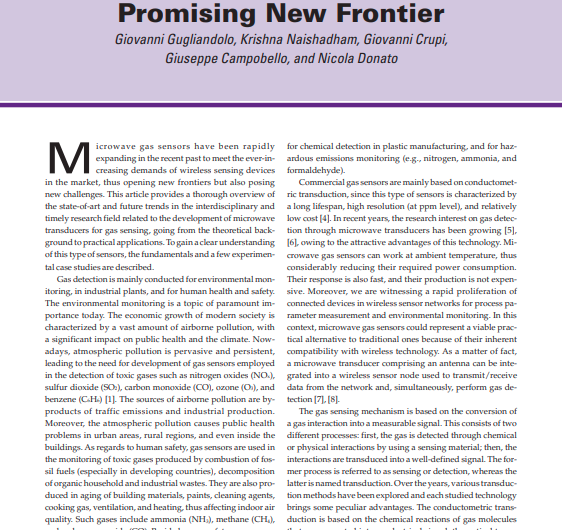 News
News
Microwave Transducers for Gas Sensing: A Challenging and Promising…
The research of new typologies of gas sensors with improved detection performance has resulted in a wide adoption of gas sensors in different fields. The technology development has led to the introduction of low-cost, compact gas sensors with improved performance in detection process. The major purposes of gas detection are environmental monitoring, human health monitoring and industrial plant safety. Today, environmental monitoring is a subject of utmost importance. A substantial amount of airborne pollution, which has a negative influence on both public health and the climate, is a hallmark of the economic prosperity of contemporary society. The need for the development of gas sensors used in the detection of harmful chemicals such nitrogen oxides, sulfur dioxide, carbon monoxide, ozone, and benzene has become more pressing as a result of today’s pervasive and persistent atmospheric pollution. Additionally, concerns with public health are brought on by atmospheric pollution in metropolitan areas, rural areas, and even inside houses.
Moreover, gas sensors are employed in medical applications. As an example, oxygen sensors are used in the oxygen therapy, while ammonia sensors have been employed to identify chronic renal illness. Finally, gas sensors are frequently used in industrial environment, including hazardous emissions monitoring, chemical detection in the production of plastics, and in the chain of food production and storing.
Commercial gas sensors typically use conductometric transducers because they have a long lifespan, great resolution (at the ppm level), and are relatively inexpensive. Due to the alluring benefits of this technology, interest in research on gas detection using microwave transducers has increased in the last years. Since microwave gas sensors may operate at room temperature, less power is needed to manage them. Moreover, they are characterized by a fast response time.
In such a context, the University of Messina has contributed to researching novel microwave transducers for sensing applications. In particular, the research group held by Prof. Donato (University of Messina, Res4Net member) has proposed several configurations of microwave gas sensors.
A brief review of the latest advances in the development of microwave transducers for gas sensing can be found here